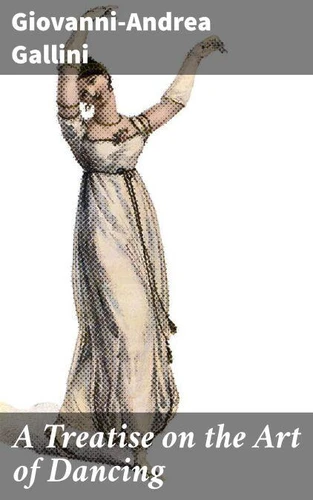A Treatise on the Art of Dancing. Mastering the Art of Dance: Techniques, History, and Insights
Par :Formats :
Disponible dans votre compte client Decitre ou Furet du Nord dès validation de votre commande. Le format ePub est :
- Compatible avec une lecture sur My Vivlio (smartphone, tablette, ordinateur)
- Compatible avec une lecture sur liseuses Vivlio
- Pour les liseuses autres que Vivlio, vous devez utiliser le logiciel Adobe Digital Edition. Non compatible avec la lecture sur les liseuses Kindle, Remarkable et Sony
 , qui est-ce ?
, qui est-ce ?Notre partenaire de plateforme de lecture numérique où vous retrouverez l'ensemble de vos ebooks gratuitement
Pour en savoir plus sur nos ebooks, consultez notre aide en ligne ici
- Nombre de pages176
- FormatePub
- ISBN406-4-06-621100-4
- EAN4064066211004
- Date de parution12/12/2019
- Protection num.Digital Watermarking
- Taille373 Ko
- Infos supplémentairesepub
- ÉditeurGOOD PRESS
Résumé
In *A Treatise on the Art of Dancing*, Giovanni-Andrea Gallini presents a comprehensive exploration of dance as both an artistic and social practice in 18th-century Europe. Gallini's prose is characterized by an elegant yet accessible style, deftly intertwining technical details with philosophical musings about the role of dance in society. Throughout the treatise, he discusses various dance forms, techniques, and the importance of aesthetics, all while drawing connections between dance and broader cultural movements of his time, making it a valuable resource for understanding the intersection of art and society in the Enlightenment era.
Gallini, hailing from a background in both dance and academia, was profoundly influenced by the cultural dynamics of his time. His experiences as a dancer and choreographer informed his belief in the transformative power of dance, motivating him to articulate its principles in a structured yet passionate format. He sought to elevate the understanding of dance from mere entertainment to a respected art form, resonating with contemporary ideals of beauty and rigor.
This treatise is an essential read for scholars and practitioners alike, offering an insightful window into the historical and theoretical aspects of dance. Gallini'Äôs work not only enriches our appreciation of dance as an art form but also invites readers to consider its enduring influence on modern artistic expressions.
Gallini, hailing from a background in both dance and academia, was profoundly influenced by the cultural dynamics of his time. His experiences as a dancer and choreographer informed his belief in the transformative power of dance, motivating him to articulate its principles in a structured yet passionate format. He sought to elevate the understanding of dance from mere entertainment to a respected art form, resonating with contemporary ideals of beauty and rigor.
This treatise is an essential read for scholars and practitioners alike, offering an insightful window into the historical and theoretical aspects of dance. Gallini'Äôs work not only enriches our appreciation of dance as an art form but also invites readers to consider its enduring influence on modern artistic expressions.
In *A Treatise on the Art of Dancing*, Giovanni-Andrea Gallini presents a comprehensive exploration of dance as both an artistic and social practice in 18th-century Europe. Gallini's prose is characterized by an elegant yet accessible style, deftly intertwining technical details with philosophical musings about the role of dance in society. Throughout the treatise, he discusses various dance forms, techniques, and the importance of aesthetics, all while drawing connections between dance and broader cultural movements of his time, making it a valuable resource for understanding the intersection of art and society in the Enlightenment era.
Gallini, hailing from a background in both dance and academia, was profoundly influenced by the cultural dynamics of his time. His experiences as a dancer and choreographer informed his belief in the transformative power of dance, motivating him to articulate its principles in a structured yet passionate format. He sought to elevate the understanding of dance from mere entertainment to a respected art form, resonating with contemporary ideals of beauty and rigor.
This treatise is an essential read for scholars and practitioners alike, offering an insightful window into the historical and theoretical aspects of dance. Gallini'Äôs work not only enriches our appreciation of dance as an art form but also invites readers to consider its enduring influence on modern artistic expressions.
Gallini, hailing from a background in both dance and academia, was profoundly influenced by the cultural dynamics of his time. His experiences as a dancer and choreographer informed his belief in the transformative power of dance, motivating him to articulate its principles in a structured yet passionate format. He sought to elevate the understanding of dance from mere entertainment to a respected art form, resonating with contemporary ideals of beauty and rigor.
This treatise is an essential read for scholars and practitioners alike, offering an insightful window into the historical and theoretical aspects of dance. Gallini'Äôs work not only enriches our appreciation of dance as an art form but also invites readers to consider its enduring influence on modern artistic expressions.



